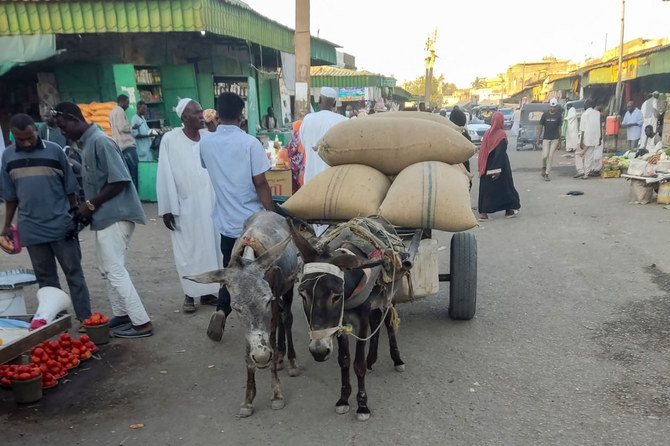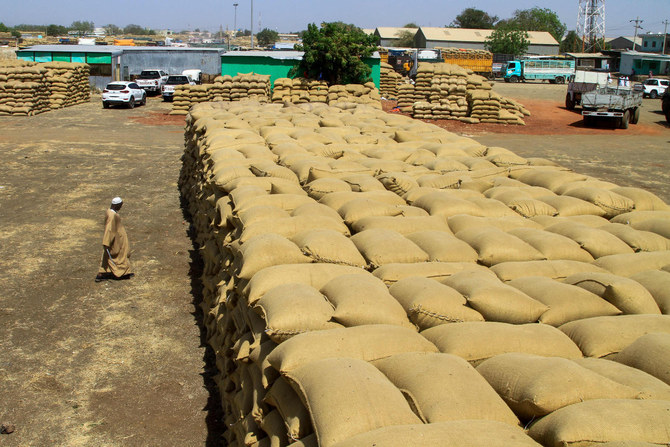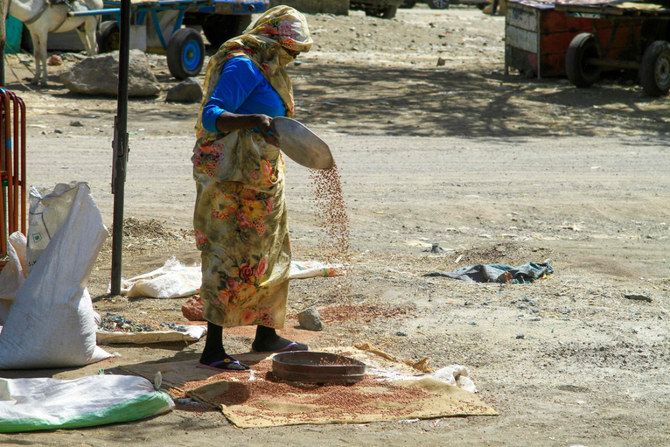PORT SUDAN, Sudan: Before the Sudanese army and paramilitary fighters turned their guns on each other last year, Ahmed used to sell one of Sudan’s main exports: gum arabic, a vital ingredient for global industry.
Now he’s out of business, and his story encapsulates the broader economic collapse of Sudan during 10 months of war.
Since combat between two rival generals began on April 15, Ahmed has been at the fighters’ mercy.
“When the war began, I had a stock of gum arabic in a warehouse south of Khartoum that was intended for export,” Ahmed told AFP, asking to use only his first name for fear of retaliation.
“To get it out I had to pay huge sums to the Rapid Support Forces,” the paramilitaries commanded by Mohamed Hamdan Dagalo who are at war with the Sudanese Armed Forces led by Abdel Fattah Al-Burhan.
“I had to pay multiple times in areas under their control, before my cargo got to areas controlled by the government,” Ahmed said.
But the government — loyal to the army — “then demanded I pay taxes” on the product, an emulsifying agent used in everything from soft drinks to chewing gum.
When the trucks finally made it to Port Sudan for export on the Red Sea, “authorities again asked for new taxes, and I had to pay storage fees six times more than before the war,” Ahmed said.
His gum arabic — like many other Sudanese products — never made it onto a ship. According to Sudan’s port authorities, international trade fell 23 percent last year.
The finance ministry, which didn’t set a national budget for 2023 or 2024 and has foregone quarterly reports, recently raised the exchange rate for imports and exports from 650 Sudanese pounds to 950.
But that is still far below the currency’s real value.
With most banks out of service, the only exchange rate that matters to ordinary Sudanese is on the black market, where the dollar currently goes for around 1,200 Sudanese pounds.
“It’s a sign of the destruction of the Sudanese economy,” former Sudanese Chamber of Commerce head Al-Sadiq Jalal told AFP.
To make matters worse, a communications blackout since early February has hampered online transactions — which Sudanese relied on to survive.
The war has led industries to cease production. Others were destroyed. Businesses and food stocks have been looted.
The World Bank in September said “widespread destruction of Sudan’s economic foundations has set the country’s development back by several decades.”
The International Monetary Fund has predicted that even after the fighting ends, “years of reconstruction” await the northeast African country.
Sudan suffered under a crippled economy for decades and was already one of the world’s poorest countries before the war.
Under the Islamist-backed regime of strongman Omar Al-Bashir, international sanctions throttled development, corruption was rampant, and South Sudan split in 2011 with most of the country’s oil production.
Bashir’s ouster by the military in 2019 following mass protests led to a fragile transition to civilian rule accompanied by signs of economic renewal and international acceptance.
A 2021 coup by Burhan and Dagalo, before they turned on each other, began a new economic collapse when the World Bank and the United States suspended vital international aid.
More than six million of Sudan’s 48 million people have been internally displaced by the war, and more than half the population needs humanitarian aid to survive, according to the United Nations.
Thousands of people have been killed, including between 10,000 and 15,000 in a single city in the western Darfur region, according to UN experts.
Now the indirect death toll is also rising.
Aid agencies have long warned of impending famine, and the UN’s World Food Programme is “already receiving reports of people dying of starvation,” the agency’s Sudan director Eddie Rowe said in early February.
The Sudanese state “is completely absent from the scene” in all sectors, economist Haitham Fathy told AFP.
Chief among those is agriculture, which could have helped stave off hunger.
Before the war, agriculture generated 35-40 percent of Sudan’s gross domestic product, according to the World Bank, and employed 70-80 percent of the workforce in rural areas, the International Fund for Agricultural Development said.
But the war has left more than 60 percent of the nation’s agricultural land out of commission, according to Sudanese research organization Fikra for Studies and Development.
In the wheat-growing state of Al-Jazira, where RSF fighters took over swathes of farmland south of Khartoum, farmers have been unable to tend their crops. They saw their livelihoods wither away.
From the wheat fields to Ahmed’s gum arabic warehouse, the story is the same.
His savings spent, his stock gone and his future bleak, Ahmed — like much of Sudan’s business class — has closed up shop.
Economy another victim of war in impoverished Sudan
https://arab.news/z2ztu
Economy another victim of war in impoverished Sudan

- With most banks out of service, the only exchange rate that matters to ordinary Sudanese is on the black market, where the dollar currently goes for around 1,200 Sudanese pounds
Amnesty slams Hezbollah for unguided rocket fire at Israeli towns

- Amnesty already released the findings of its investigation into Israeli actions during the war
- A fragile ceasefire between Israel and Hezbollah took effect on November 27
“Hezbollah’s reckless use of unguided rocket salvos has killed and wounded civilians, and destroyed and damaged civilian homes in Israel,” said Amnesty’s Secretary General Agnes Callamard.
“The use of these inherently inaccurate weapons in or near populated civilian areas amounts to prima facie violations of international humanitarian law,” she said.
“Direct attacks on civilians and civilian objects and indiscriminate attacks that kill and injure civilians must be investigated as war crimes.”
Amnesty said it had documented three Hezbollah rocket attacks on Israeli towns and cities that killed eight civilians and wounded at least 16 others following the escalation of the conflict in late September.
In footage of the attacks, it said it had identified the use of unguided multiple launch rocket systems that violate the bedrock principle of distinction under international humanitarian law.
At the time, Hezbollah announced a series of rocket barrages targeting Israeli population centers in response to Israeli air strikes on Lebanese towns and villages.
Amnesty already released the findings of its investigation into Israeli actions during the war.
It said it had documented unlawful Israeli air strikes that killed 49 civilians, which must be investigated as war crimes.
A fragile ceasefire between Israel and Hezbollah took effect on November 27.
Despite the truce, Israeli air strikes have killed more than 20 people in Lebanon since November 27, according to an AFP tally based on health ministry figures.
Both Israel and Hezbollah accuse each other of repeatedly violating the ceasefire.
Since Hezbollah first started trading cross-border fire with the Israeli army in October 2023, the war has killed more than 4,000 people in Lebanon, according to health ministry figures.
On the Israeli side, the conflict has killed 30 soldiers and 47 civilians, according to an AFP tally based on official figures.
Security for Kurds ‘essential’ for a secure Syria: German FM

- “The view that the PKK/YPG represents the Kurds in Syria is wrong,” the source quoted him as saying, stressing Turkiye would never allow such “terrorist organizations to abuse the situation in Syria”
ANKARA: Security for the Kurdish people is critical for Syria to have a secure future, German Foreign Minister Annalena Baerbock told her Turkish counterpart in Ankara on Friday.
“Security, especially for Kurds, is essential for a free and secure future for Syria,” she told journalists after meeting Turkish Foreign Minister Hakan Fidan, warning of the dangers of any “escalation” with Kurdish forces in Syria.
Earlier Friday, Baerbock raised the alarm over fresh violence in northern Syria, where Turkish troops and Ankara-backed fighters have been battling the Syrian Defense Forces (SDF), a Kurdish-led group supported by the US.
Ankara sees the SDF as an extension of its domestic nemesis, the Kurdistan Workers’ Party (PKK) which has led a decades-long insurgency on Turkish soil, with President Recep Tayyip Erdogan insisting Friday it was “time to neutralize the existing terror organizations in Syria.”
Her comments came as concerns grew over a possible Turkish assault on the Kurdish-held border town of Kobani, also known as Ain Al-Arab, after pro-Turkish fighters seized Manbij and Tal Rifaat, two other key Kurdish-held towns.
As Islamist-led rebels pressed their lightning that toppled Bashar Assad, Turkish-backed fighters began a parallel operation against Kurdish-led forces in the north, sparking clashes that left hundreds dead in just a few days.
“Thousands of Kurds from Manbij and other places are on the run in Syria or are afraid of fresh violence,” the German minister said.
“I made it very, very clear today that our common security interests must not be jeopardized by an escalation with the Kurds in Syria.”
But she expressed understanding for Ankara’s “legitimate” security concerns, saying “northeast Syria must not pose a threat to Turkiye” while also warning that Islamic State (IS) group jihadists must not be allowed to regain a foothold in Syria.
“No one would be helped if the real winner of a conflict with the Kurds turned out to be the terrorists of IS: that would be a security threat for Syria, Turkiye and also for us in Europe.”
According to a foreign ministry source, Fidan told her the PKK and the YPG — the main force within the SDF — did not represent the Kurdish people.
“The view that the PKK/YPG represents the Kurds in Syria is wrong,” the source quoted him as saying, stressing Turkiye would never allow such “terrorist organizations to abuse the situation in Syria.”
“We expect all our allies to respect Turkiye’s security concerns,” he added.
Baerbock also said Berlin would judge Syria’s new Islamist-led HTS rulers on the basis of their actions amid concerns over the group’s Al-Qaeda origins.
“A radical Islamist order will only lead to new fragmentation, new oppression and therefore new violence,” she said.
“We will judge the new rulers by their actions.”
UN extends peacekeeping mission between Syria, Israeli-occupied Golan Heights

- Armed forces from Israel and Syria are not allowed in the demilitarized zone — a 400-square-km (155-square-mile) “Area of Separation” — under the ceasefire arrangement
UNITED NATIONS: The United Nations Security Council on Friday extended a long-running peacekeeping mission between Syria and the Israeli-occupied Golan Heights for six months and expressed concern that military activities in the area could escalate tensions.
Since a lightning rebel offensive ousted Syrian President Bashar Assad earlier this month, Israeli troops have moved into the demilitarised zone — created after the 1973 Arab-Israeli war — that is patrolled by the UN Disengagement Observer Force (UNDOF).
Israeli officials have described the move as a limited and temporary measure to ensure the security of Israel’s borders but have given no indication of when the troops might be withdrawn.
In the resolution adopted on Friday, the Security Council stressed “that both parties must abide by the terms of the 1974 Disengagement of Forces Agreement between Israel and the Syrian Arab Republic and scrupulously observe the ceasefire.”
It expressed concern that “the ongoing military activities conducted by any actor in the area of separation continue to have the potential to escalate tensions between Israel and the Syrian Arab Republic, jeopardize the ceasefire between the two countries, and pose a risk to the local civilian population and United Nations personnel on the ground.”
Armed forces from Israel and Syria are not allowed in the demilitarized zone — a 400-square-km (155-square-mile) “Area of Separation” — under the ceasefire arrangement.
UN Secretary-General Antonio Guterres said on Thursday: “Let me be clear: There should be no military forces in the area of separation other than UN peacekeepers – period.” He also said Israeli airstrikes on Syria were violations of the country’s sovereignty and territorial integrity and “must stop.”
Israeli airstrikes kill at least 25 Palestinians in Gaza, medics say

- Authorities in Gaza say Israel’s campaign has killed more than 45,000 Palestinians and displaced most of the population of 2.3 million
CAIRO: Israeli airstrikes killed at least 25 Palestinians in the Gaza Strip on Friday, medics said, including at least eight in an apartment in the Nuseirat refugee camp and at least 10, including seven children, in the town of Jabalia.
Mediators have yet to secure a ceasefire between Israel and the Islamist group Hamas after more than a year of conflict.
Sources close to the discussions told Reuters on Thursday that Qatar and Egypt had been able to resolve some differences between the warring parties but sticking points remained.
Israel began its assault on Gaza after Hamas-led fighters attacked Israeli communities on Oct. 7, 2023, killing 1,200 people and taking over 250 hostages, according to Israeli tallies. Israel says about 100 hostages are still being held, but it is unclear how many are alive.
Authorities in Gaza say Israel’s campaign has killed more than 45,000 Palestinians and displaced most of the population of 2.3 million. Much of the coastal enclave is in ruins.
US says new Syria rulers helping in hunt for reporter Tice

- Tice was working for Agence France-Presse, McClatchy News, The Washington Post, CBS and other media outlets when he was detained at a checkpoint in August 2012
WASHINGTON: US officials said Friday that Syria’s new leaders had assisted in the hunt for missing journalist Austin Tice, with searches underway at sites of interest.
US diplomats, paying the first visit to Damascus since Islamist-led rebels toppled strongman Bashar Assad earlier this month, said they told the new Islamist-led authorities of their priority of finding Tice and other missing Americans.
“We feel it’s our duty as the US government to press on until we know with certainty what happened to him, where he is and to bring him home,” said Roger Carstens, the US pointman on hostages.
He said that he worked Friday with the new Syrian leadership to search a location where Tice could have been held.
“There are other locations that need to be searched in the coming days, weeks and months, and we’ll be working with the interim authorities,” Carstens told reporters after the trip.
Tice was working for Agence France-Presse, McClatchy News, The Washington Post, CBS and other media outlets when he was detained at a checkpoint in August 2012.
Carstens said that US teams were not yet authorized to operate in Syria but that he has reached out to non-governmental groups as well as journalists for assistance.
“The bottom line is that over 12 years, we’ve been able to pinpoint about six facilities that we believe have a high possibility of having had Austin Tice at one point or another,” he said.
Carstens said up to three more sites of interests have been added recently and that he hoped for thorough searches of all of them.
Tice’s mother Debra said earlier this month that she had information that her son was alive.
Carstens said that the United States was also seeking information about other Americans including Majd Kamalmaz, a Syrian-American psychotherapist believed to have died after being detained under the Assad government in 2017.






















